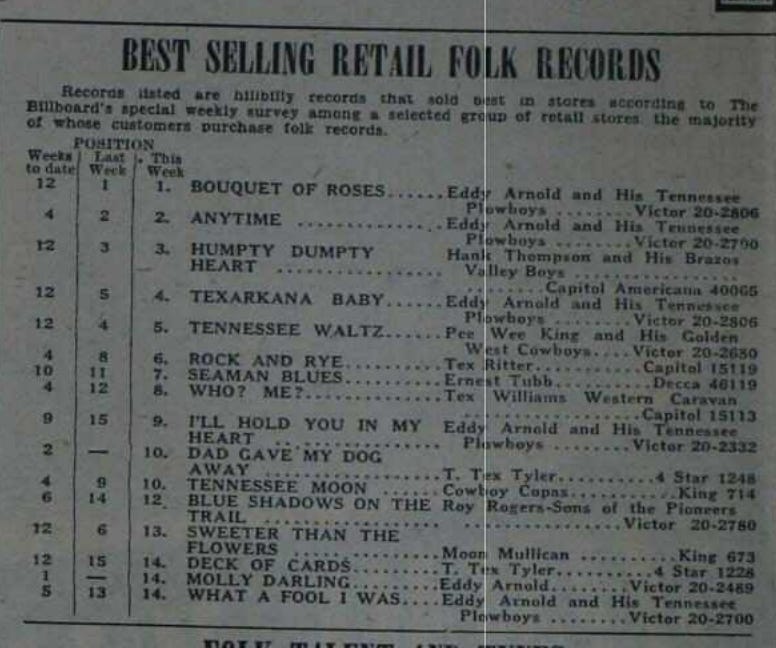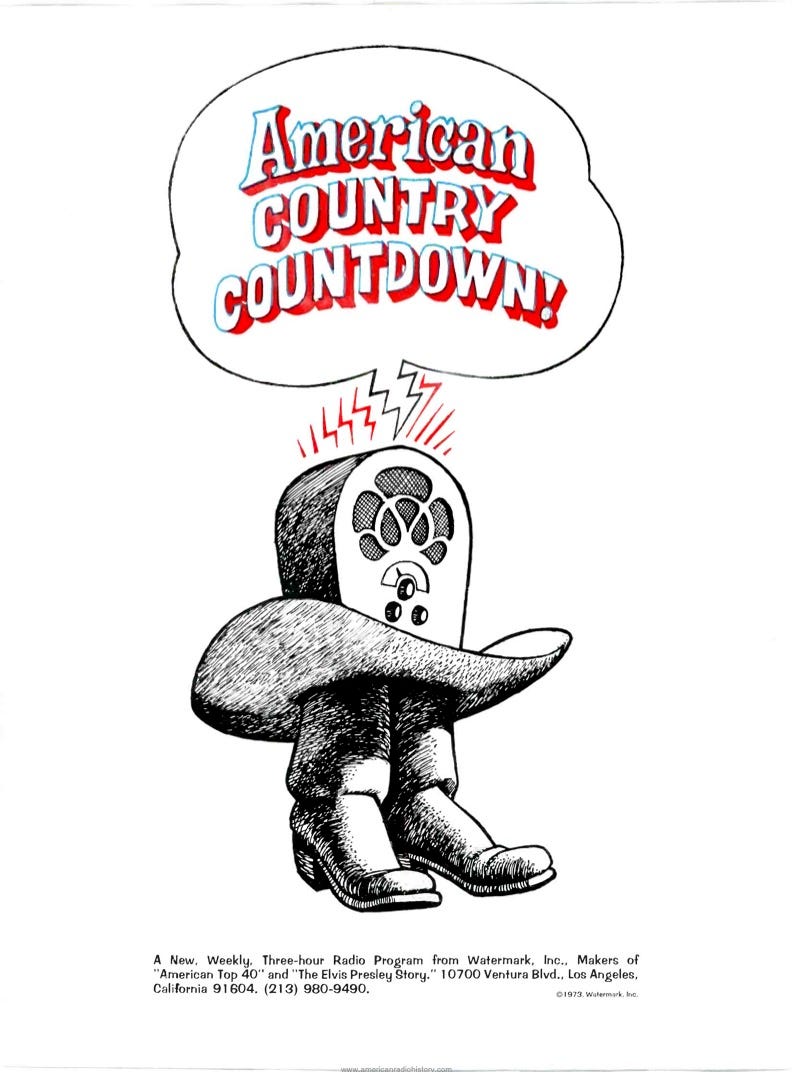Issue #17: This Week In Country Chart History - An anti-car anthem, a Bob Dylan cover & Tennessee songs
Dipping our toes in the vastness of the music called country
By Natalie
When I get bogged down in the endless debates about what country music is or isn’t that inevitably come back to some inadequate, ahistorical and self-serving binary — as I have this week — I like to turn to the crates. The records tell a healthy portion of the story, and never fail to serve as a reminder of just how much music (good and bad, righteous and shameful) has been made over the years under the umbrella of whatever “country” is.
For me, at least, there are few more compelling jumping-off points for researching old music than back issues by my former employer, Billboard. I think I know all the hits until I actually start digging through the industry rag’s pages, where I never fail to find things that surprise and delight. Here, I’ll share some highlights from 75, 50, and 25 years back on (and adjacent to) the charts.
75 years ago
This early on, the Billboard charts were basically a bunch of moderately educated (and sometimes payola-induced) guesses — and as is obvious here, the people writing them 75 years ago were hearing a hell of a lot of Eddy Arnold. The summer of 1948 was a big one for the crooner and his Tennessee Plowboys (no relation, I’m sure, to the Texas Playboys…) — here, “Bouquet of Roses" tops the chart. It was a prototypical song from this period, which was rife with men (and yes the chart here is entirely made up of them) singing about how awful women are. I call it Drake country: “I begged you to be different,” Arnold sings, “but you’ll always be untrue/I’m tired of forgiving, now there’s nothing left to do.”
Aside from “Dad Gave My Dog Away” (???? a spoken word piece about a dog named Bruce…good name for a dog) and one million Eddy Arnold songs, one of the other through-lines of this chart is its Tennessee theme. The first charting iteration of the now-standard “Tennessee Waltz,” by Pee Wee King and his Golden West Cowboys (coincidentally, Eddy Arnold’s old band), was just past its chart peak; another version of the song by Cowboy Copas was still on the jukebox charts. Confusingly, Copas — who had also been in Pee Wee’s band — actually recorded the song first, and then immediately recorded and released another very similar song called “Tennessee Moon” (also charting here) before his “Waltz” even hit store shelves. Where did this sudden fascination with Tennessee-themed waltzes come from?? Well, Bill Monroe, who had considerable success with his “Kentucky Waltz” and “Blue Moon Of Kentucky.” King and his singer, Redd Stewart, spun up some lyrics to a wordless waltz melody they’d been playing for years, and thus one of country’s prettiest standards was born. I’m particularly partial to this heavenly Bonnie Raitt and Norah Jones version.
50 years ago
OK, most important: Look what was considered newsworthy on July 28, 1973.
This is one example of why it’s so wildly frustrating to still be having this same conversation — literally identical — 50 years later. We have not progressed; we are stuck in the same toxic cycle of treating Black artists like a novelty in a genre they not only have full claim to, but a long rich history within. Roosevelt Savannah, whose one LP (recorded in Vancouver, WA of all places) is pictured at the top of this post, is a new name to me; so is Jo Ann Sweeney. Here’s a sampling of their work:
Also, this one by Welton Lane….hell yes:
Anyway, pause for a master class in graphic design:
And finally to the chart itself (I apologize for the quality, gotta read between the lines here a little). There’s so much here to talk about — obviously the outlaws are ascendant, with Willie, Waylon and Kris all appearing on the chart (Kinky Friedman (!) is even there towards the bottom); a woman (whaaaa?!) on top of the chart — Donna Fargo, with her weeper “You Were Always There”; the rise of notable perfect song, the much funkier than it has any right to be “Louisiana Woman, Mississippi Man”; the presence of modest to hardcore horny country hits via Conway Twitty, Jeannie Seely, David Houston and Jeanne Pruett.
What intrigued me most, though — probably because of our obnoxious discourse-y zeitgeist — were two political-ish songs. At least, if they were released today, they would certainly be read as such. Tom T. Hall — legend, icon, titan, outlaw before the outlaws — had a song called “Watergate Blues” at No. 31 on the chart (it would eventually peak at No. 16). The Senate Watergate hearings were being televised that summer, and the song, which basically tells the story of what happened with Watergate couched in general government cynicism, is obviously quite topical without being extremely partisan (I can’t tell if his use of “liberal media” is satirical or sincere here…thinking the former but it’s eerie either way!).
The No. 2 country song, “Lord, Mr. Ford” by Jerry Reed, is an anti-car song written by a trans woman. Really! Deena Kaye Rose, who had not yet transitioned during her hot streak as a Music Row songwriter, penned this perfect song which is as far from the current truck-beer-bingo formula as you can imagine. I was already in my Jerry Reed era, and this is adding fuel to the fire:
Well now, how I yearn for the good old days
Without that carbon monoxide haze
A-hanging over the roar of the interstate
Well, if the Lord that made the moon and stars
Would have meant for me and you to have cars
He'd have seen that we was all born with a parking space
Incredible!! The song would become the second of Reed’s three country No. 1 hits, which is just wild to think about.
25 years ago
Goddamn have we regressed. Garth atop the charts with his goofy Bob Dylan cover. Seven out of the top 10 slots occupied by SEVEN DIFFERENT WOMEN. Two of my all-time-favorite George Strait songs in the top 20 (yes, I am aware one is a John Prine song! I also like Strait’s take). The Chicks on the cusp of their first No. 1 with a perfect song. “This Kiss,” “Where The Green Grass Grows” and “Bye Bye” ascendant. You could just listen through this and have a pretty nice time.
Now
Kane Brown and Tracy Chapman getting hefty country radio checks are the only things saving the top ten from irrevocable bleakness. I truly cannot. But hopefully my indulging my nostalgia also helped you take a little break from thinking about Aldean awfulness — and/or made you mad enough to keep fighting for better. This is not progress. We are moving backwards, and we’ve gotta undermine the profit-driven systems pushing us that way.










Oof yeah that Garth cover has a lot to answer for in why a lotta Dylan fans think of "Make You Feel My Love" as irredeemable schmaltz
That 1998 chart would make an excellent Friday playlist ;) I honestly liked the Garth cover at the time and still do. Also fun to see Lee Ann Womack and Chely Wright on there. I loved Lee Ann's first album and knew every word of Buckaroo.